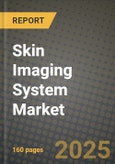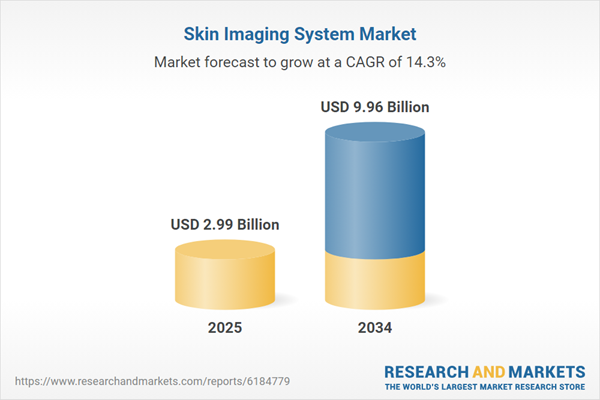Skin Imaging System Market
The Skin Imaging System market spans devices and software used to visualize, document, and analyze skin structure and lesions across dermatology clinics, hospitals, cancer centers, medical spas, aesthetic clinics, research institutions, and clinical trial networks. Core applications include dermoscopy and digital dermoscopy for pigmented lesions; total body photography and 3D mapping for longitudinal surveillance; multispectral/UV imaging for vascular and pigmentation assessment; reflectance confocal microscopy (RCM), optical coherence tomography (OCT), and high-frequency ultrasound for in-vivo microstructure; and AI-assisted decision support for triage and risk scoring. Latest trends converge on cloud-connected workflows, AI classifiers embedded at the edge, interoperable archives (DICOM-ready image management), and teledermatology that links capture stations with remote experts. Growth drivers include rising skin cancer incidence and screening programs, the consumerization of aesthetics and skin health, workflow digitalization in outpatient care, and the need for objective endpoints in trials for dermatology and medical aesthetics. Competitive intensity is shaped by established imaging OEMs, AI-first software firms, and niche innovators offering modality-specific tools (e.g., RCM, OCT), with value moving toward integrated platforms that pair high-fidelity capture with analytics, report automation, and EHR interoperability. Procurement criteria emphasize diagnostic confidence, reproducibility, speed, cybersecurity, and total cost of ownership - covering service, calibration, and upgrade paths. Over the forecast horizon, adoption will favor modular systems that scale from single-room practices to multi-site networks, with AI models tuned to diverse skin tones, portable capture for primary care triage, and standardized image quality metrics enabling longitudinal comparability and real-world evidence generation.Skin Imaging System Market Key Insights
- From image capture to evidence. Buyers prioritize systems that transform images into structured data - lesion segmentation, trend graphs, and risk scores - integrated into reports and patient portals, reducing documentation time while improving follow-up adherence.
- AI moves from pilot to practice. Classifiers for melanoma triage, acne grading, and erythema/pigment quantification mature within clinically supervised workflows. Human-in-the-loop designs, bias auditing across skin tones, and continuous learning pipelines are becoming table stakes.
- Longitudinal surveillance at scale. Total body photography with body-mapping and change-detection algorithms reduces missed lesions in high-risk cohorts. Consistent positioning, lighting control, and automated lesion linking enable reliable year-over-year comparisons.
- Advanced, noninvasive micro-imaging. RCM and OCT gain traction for margin assessment, equivocal lesions, and treatment monitoring, helping avoid unnecessary biopsies. High-frequency ultrasound complements for depth and nodularity in inflammatory and aesthetic indications.
- Aesthetics and cosmeceuticals broaden demand. Multispectral and UV imaging quantify pores, wrinkles, pigmentation, and vascularity, supporting personalized treatment plans and demonstrating outcomes, which boosts conversion and retention in private clinics.
- Interoperability and data stewardship. DICOM support, HL7/FHIR hooks, and vendor-neutral archives reduce lock-in and enable cross-site benchmarking. Cybersecurity hardening, role-based access, and audit trails are critical to enterprise rollouts.
- Teledermatology and hub-and-spoke models. Portable, smartphone-tethered dermoscopes and browser-based viewers extend specialist reach to primary care and pharmacies. Asynchronous consults with embedded image quality checks improve throughput.
- Operational economics and uptime. Automated calibration, quick-swap light modules, and remote diagnostics shrink downtime. Subscription bundles (hardware + AI + PACS) shift capex to opex and simplify multi-site standardization.
- Clinical trials and endpoint objectivity. Sponsors adopt imaging endpoints for psoriasis, atopic dermatitis, acne, and aesthetics. Certified capture protocols and central reads improve signal-to-noise and accelerate study timelines.
- Equity and usability by design. Training datasets, illumination spectra, and algorithm thresholds are tuned for diverse Fitzpatrick types. Intuitive UI, on-device guidance, and multilingual prompts lower technician variability and risk.
Skin Imaging System Market Reginal Analysis
North America
Adoption is driven by skin cancer screening, integrated health networks, and aesthetic medicine’s strong private-pay base. Clinics favor platforms that unify dermoscopy, body mapping, and AI triage with EHR/PACS integration. Reimbursement progress for teledermatology sustains remote workflows, while enterprise buyers demand cybersecurity certifications, uptime SLAs, and multi-site device management. Academic centers lead in RCM/OCT and trial-grade imaging, setting standards that diffuse to community practices.Europe
Guideline-led screening and public systems emphasize diagnostic accuracy, data privacy, and vendor-neutral archiving. National programs for melanoma surveillance support total body photography with change-detection. Procurement often favors modular systems with DICOM compliance and robust service networks. University hospitals expand noninvasive micro-imaging for equivocal lesions, while private clinics leverage multispectral aesthetics imaging to differentiate services within strict advertising and clinical claims frameworks.Asia-Pacific
Urbanization and rising skin health awareness fuel demand across hospital dermatology, premium clinics, and pharmacy-led services. Japan, Korea, and Australia are early adopters of high-fidelity imaging and AI-assisted dermoscopy; China and India scale portable devices and telederm to address specialist shortages. Aesthetics growth accelerates multispectral platforms for complexion analysis. Localized interfaces, cloud options aligned to data-residency rules, and distributor-led service are decisive.Middle East & Africa
Growth clusters in tertiary hospitals, private dermatology chains, and medical tourism hubs. Hot, high-UV environments raise screening demand, while premium clinics invest in aesthetics imaging to demonstrate outcomes. Buyers prioritize rugged hardware, rapid onboarding, and bilingual interfaces. Partnerships with regional distributors for training, calibration, and remote support are key to uptime; cloud deployment must address data sovereignty and security policies.South & Central America
Private clinics and emerging teledermatology networks underpin adoption, with emphasis on affordable dermoscopy, total body mapping for high-risk patients, and aesthetics imaging in metropolitan areas. Public providers pilot hub-and-spoke screening to extend reach beyond capitals. Vendors successful in the region offer flexible financing, Spanish/Portuguese workflows, and strong after-sales service, including remote diagnostics and standardized capture protocols to ensure consistency across varied settings.Skin Imaging System Market Segmentation
By Product
- Full-Body Imaging Systems
- Face Imaging Systems
- Dermatoscopy Imaging
- Software
By Indication
- Skin Cancer Diagnostics
- Skin Rejuvenation
- Acne
- Warts
- Hair Health & Removal
- Psoriasis
- Wrinkles & Pores
- Injectables
- Facelifts
- Rhinoplasty
- Surgical Planning
- Others
By Technology
- Ultrasound Imaging
- Optical Coherence Tomography
- Confocal Microscopy
- Dermatoscopy
- Total Body Photography
- Others
By End-User
- Hospitals
- Independent Dermatological Clinics
- Dermatology Clinics Chains
- Aesthetic Clinics
Key Market players
Canfield Scientific, FotoFinder Systems, Derma Medical Systems (MoleMax), Caliber Imaging & Diagnostics (VivaScope), MedX Health Corp., SciBase AB, MetaOptima Technology (DermEngine), 3Gen (DermLite), Heine Optotechnik, Pixience, Aram Huvis, Courage+Khazaka electronic GmbH, SkinIO, MoleMap, Cortex TechnologySkin Imaging System Market Analytics
The report employs rigorous tools, including Porter’s Five Forces, value chain mapping, and scenario-based modelling, to assess supply-demand dynamics. Cross-sector influences from parent, derived, and substitute markets are evaluated to identify risks and opportunities. Trade and pricing analytics provide an up-to-date view of international flows, including leading exporters, importers, and regional price trends.Macroeconomic indicators, policy frameworks such as carbon pricing and energy security strategies, and evolving consumer behaviour are considered in forecasting scenarios. Recent deal flows, partnerships, and technology innovations are incorporated to assess their impact on future market performance.
Skin Imaging System Market Competitive Intelligence
The competitive landscape is mapped through proprietary frameworks, profiling leading companies with details on business models, product portfolios, financial performance, and strategic initiatives. Key developments such as mergers & acquisitions, technology collaborations, investment inflows, and regional expansions are analyzed for their competitive impact. The report also identifies emerging players and innovative startups contributing to market disruption.Regional insights highlight the most promising investment destinations, regulatory landscapes, and evolving partnerships across energy and industrial corridors.
Countries Covered
- North America - Skin Imaging System market data and outlook to 2034
- United States
- Canada
- Mexico
- Europe - Skin Imaging System market data and outlook to 2034
- Germany
- United Kingdom
- France
- Italy
- Spain
- BeNeLux
- Russia
- Sweden
- Asia-Pacific - Skin Imaging System market data and outlook to 2034
- China
- Japan
- India
- South Korea
- Australia
- Indonesia
- Malaysia
- Vietnam
- Middle East and Africa - Skin Imaging System market data and outlook to 2034
- Saudi Arabia
- South Africa
- Iran
- UAE
- Egypt
- South and Central America - Skin Imaging System market data and outlook to 2034
- Brazil
- Argentina
- Chile
- Peru
Research Methodology
This study combines primary inputs from industry experts across the Skin Imaging System value chain with secondary data from associations, government publications, trade databases, and company disclosures. Proprietary modeling techniques, including data triangulation, statistical correlation, and scenario planning, are applied to deliver reliable market sizing and forecasting.Key Questions Addressed
- What is the current and forecast market size of the Skin Imaging System industry at global, regional, and country levels?
- Which types, applications, and technologies present the highest growth potential?
- How are supply chains adapting to geopolitical and economic shocks?
- What role do policy frameworks, trade flows, and sustainability targets play in shaping demand?
- Who are the leading players, and how are their strategies evolving in the face of global uncertainty?
- Which regional “hotspots” and customer segments will outpace the market, and what go-to-market and partnership models best support entry and expansion?
- Where are the most investable opportunities - across technology roadmaps, sustainability-linked innovation, and M&A - and what is the best segment to invest over the next 3-5 years?
Your Key Takeaways from the Skin Imaging System Market Report
- Global Skin Imaging System market size and growth projections (CAGR), 2024-2034
- Impact of Russia-Ukraine, Israel-Palestine, and Hamas conflicts on Skin Imaging System trade, costs, and supply chains
- Skin Imaging System market size, share, and outlook across 5 regions and 27 countries, 2023-2034
- Skin Imaging System market size, CAGR, and market share of key products, applications, and end-user verticals, 2023-2034
- Short- and long-term Skin Imaging System market trends, drivers, restraints, and opportunities
- Porter’s Five Forces analysis, technological developments, and Skin Imaging System supply chain analysis
- Skin Imaging System trade analysis, Skin Imaging System market price analysis, and Skin Imaging System supply/demand dynamics
- Profiles of 5 leading companies - overview, key strategies, financials, and products
- Latest Skin Imaging System market news and developments
Additional Support
With the purchase of this report, you will receive:- An updated PDF report and an MS Excel data workbook containing all market tables and figures for easy analysis.
- 7-day post-sale analyst support for clarifications and in-scope supplementary data, ensuring the deliverable aligns precisely with your requirements.
- Complimentary report update to incorporate the latest available data and the impact of recent market developments.
This product will be delivered within 1-3 business days.
Table of Contents
Companies Mentioned
- Canfield Scientific
- FotoFinder Systems
- Derma Medical Systems (MoleMax)
- Caliber Imaging & Diagnostics (VivaScope)
- MedX Health Corp.
- SciBase AB
- MetaOptima Technology (DermEngine)
- 3Gen (DermLite)
- Heine Optotechnik
- Pixience
- Aram Huvis
- Courage+Khazaka electronic GmbH
- SkinIO
- MoleMap
- Cortex Technology
Table Information
| Report Attribute | Details |
|---|---|
| No. of Pages | 160 |
| Published | November 2025 |
| Forecast Period | 2025 - 2034 |
| Estimated Market Value ( USD | $ 2.99 Billion |
| Forecasted Market Value ( USD | $ 9.96 Billion |
| Compound Annual Growth Rate | 14.3% |
| Regions Covered | Global |
| No. of Companies Mentioned | 15 |









